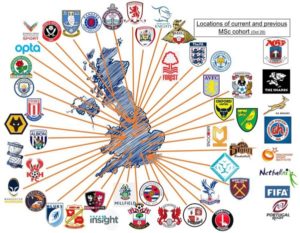Embedding Applied Learning Through Innovative Course Design on the MSc Sport (Applied Performance Analysis)
By John Francis, Lecturer and Course Leader, Michael Bateman, Lecturer, Jamie Kyte, Technical Demonstrator School of Sport and Exercise Science
This case study demonstrates the innovative approach to course design used throughout the MSc Sport (Applied Performance Analysis) course to maximise applied learning. We highlight the positive impact on students’ professional practice and the course team’s ability to continually reflect and develop subject knowledge.
To maximise the applied learning, we work collaboratively with sports organisations to provide funded season-long placements. These allow students to engage with employability skills from the outset, through formal applications and an interview process that replicates industry practice (A1, K2). Additionally, the value clubs place on student placements has enabled a year-on-year increase in the number of funded opportunities available (V2). For 2019/2020, 14 funded positions across eight sports organisations were offered, an increase of four from 2018/2019. Furthermore, in 2020/2021 two new organisations recruited students.
The course team engage in continual dialogue with sports organisations to further our understanding of the complexities of working in sport alongside post-graduate learning. Intensive weeks and weekly synchronous online learning sessions are aligned to fixture breaks and accessible to all learners (V1). We fully embed Vygotsky’s (1987) view of learning, ensuring our teaching is research informed. We focus on increasing interaction and participation through tasks and scenario-based activities in dedicated group study spaces (A1,A4,K3). Changes to the course have been positively received by students, reporting 100% satisfaction on core modules (MERF) and 83% satisfaction on overall course structure (PTES).
When making revisions, we recognised the opportunity to align our module content and assessment types to similar industry workflows and offer autonomy and flexibility to specific analysis roles (first team, youth, recruitment etc.). For example, students on MSPO4252 now evaluate the processes regarding validity and reliability between theory and applied settings to identify ‘best practice’ (A3). With the assessment occurring early in the year, students found this provided good opportunity to reinforce their knowledge of “the why behind what we do as analysts, ensuring our data throughout the season is accurate”. Subsequently, students apply their theoretical subject knowledge into practice over a long duration (A1,A4,K1).
We embedded key technical and employability skills within students’ individual development through ‘Job Club’ and ‘The Skills Passport’ (V1). Students work with the technical demonstrator to improve skills through access to the best industry software, displaying their progress through summative and formative assessments, and building a portfolio that can be presented at interviews (A2,A3,K2). The content and assessments now acknowledge key criteria and competencies identified on jobs and within professional accreditation frameworks.
The assessment changes now provide organisations with richer evidence to evaluate their provisions. This aids our understanding and reinforces the importance of the mutually beneficial relationships between the university, student and organisation, with assessment findings acting as conversation starter when engaging in the next recruitment cycle (V3,V4).
Through these relationships, placement providers are invited to deliver industry and employability content during the intensive weeks (K3,V2,V3). These opportunities provide a different voice and translate the theoretical learning into applied context. Furthermore, it identifies areas and topics for us to explore for CPD (A5,V3), ensuring we can continuously aid students’ learning and provides a valuable networking opportunity for the students.
By emphasising placement learning and individual development within the course design, the number of students obtaining full-time employment or promotion is above the national average. Despite the global pandemic, 12 students in the 2019/20 cohort have been offered full-time roles at organisations growing to our increasing alumni (see Figure 1).

Figure 1: MSc Sport (Applied Performance Analysis) current and alumni employment locations.
Approaching the course recruitment, teaching/learning, and employability as inter-related has been instrumental in supporting our students. Through collaboration with organisations, we have continually developed our knowledge, ensuring our teaching is evidence-informed. We continue to reflect as a team to identify areas for improvement in our current provision but also to introduce elements that organisations deem to be emerging topics.
Reference
Vygotsky, L. (1987) ‘Thinking and Speech’, in Rieber, R. and Carton, A. (eds) The Collected Works of L.S Vygotsky. London: Plenum Press, pp. 39 – 225.
